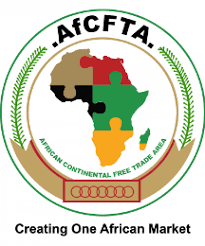
The signed African Continental Free Trade Area Agreement (AfCFTA) shows Africa is on a path of economic independence and inward industrial growth. A proper review of policy options and measures, will ensure a successful implementation of the AfCFTA agreement and enhance the bargaining power of African sovereign entities in international trade negotiations. The potential benefits come in terms of diversified sources of growth and exports, developed global value chain, integration of African countries into global trade and improved terms of trade across Africa. The IMF Direction of Trade Statistics database 2018 show that in 2017 the ratio of trade growth to GDP growth rose to 1.5, after falling below parity in 2016 (lowest in 15 years) i.e. Africa’s trade has grown much faster than the world average by recovery in prices of goods and strengthening of cross-border investment. Africa is expected to have steady economic growth with improvement in 2018 and beyond. However, there are risks to global demand, especially if the ongoing transition and re-balancing in China leads to growth deceleration which in the process affects business confidence and investment decision. Hopefully AfCFTA will mitigate these adverse effects because it can significantly boost intra-African trade.
